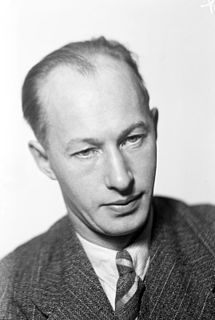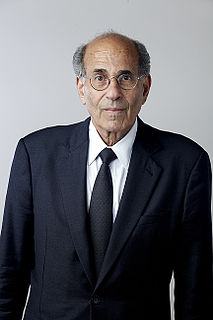A Quote by Eyvind Johnson
Many men of science and poets have in their own manner, by various ways and means, and aided by others, sought unceasingly to create a more tolerable world for everyone.
Related Quotes
Whereas happiness is the highest good, being a realization and perfect practice of virtue, which some can attain, while others have little or none of it, the various qualities of men are clearly the reason why there are various kinds of states and many forms of government; for different men seek after happiness in different ways and by different means, and so make for themselves different modes of life and forms of government.
In the temple of science are many mansions, and various indeed are they that dwell therein and the motives that have led them thither. Many take to science out of a joyful sense of superior intellectual power; science is their own special sport to which they look for vivid experience and the satisfaction of ambition; many others are to be found in the temple who have offered the products of their brains on this altar for purely utilitarian purposes.
To many forms of life of our northern lands, winter means a long sleep; to others, it means what it means to many fortunate human beings - travels in warm climes. To still others, who again have their human prototypes, it means a struggle, more or less fierce, to keep soul and body together; while to many insect forms, it means death.
As for what I have done as a poet, I take no pride in whatever. Excellent poets have lived at the same time with me, poets more excellent lived before me, and others will come after me. But that in my country I am the only person who knows the truth in the difficult science of colors-of that, I say, I am not a little proud, and here have a consciousness of superiority to many.
In your school you take part in various activities that habituate you not to shut yourselves in on yourselves or in your small world, but to be open to others, especially to the poorest and neediest, to work to improve the world in which we live. Be men and women with others and for others, real champions in the service of others. To be magnanimous with interior liberty and a spirit of service, spiritual formation is necessary. Dear children, dear youths, love Jesus Christ ever more!
Have you thought about what it means to be a god?" asked the man. He had a beard and a baseball cap. "It means you give up your mortal existence to become a meme: something that lives forever in people's minds, like the tune of a nursery rhyme. It means that everyone gets to re-create you in their own minds. You barely have your own identity any more. Instead, you're a thousand aspects of what people need you to be. And everyone wants something different from you. Nothing is fixed, nothing is stable.
For such is the nature of men, that howsoever they may acknowledge many others to be more witty, or more eloquent, or more learned, yet they will hardly believe there be many so wise as themselves, for they see their own wit at hand, and other men's at a distance. But this proveth rather that men are in that point equal, than unequal. For there is not ordinarily a greater sign of the equal distribution of any thing than that every man is contented with his share.
I like the iPhone, the iPad, all the various members of that family. But I like all the various technologies that are becoming available to make the world more accessible to people who are blind and with low vision. I also like that more and more people are committing themselves to close captioning so the deaf can really know what's going on. I like the position of making buildings more accessible by having ramps and various ways people who are paraplegic to be able to get around.
Nearly all men and women are poetical, to some extent, but very few can be called poets. There are great poets, small poets, and men and women who make verses. But all are not poets, nor even good versifiers. Poetasters are plentiful, but real poets are rare. Education can not make a poet, though it may polish and develop one.






































